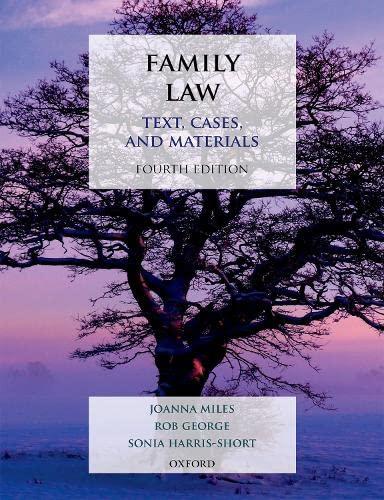Question
Legal cased based assignment Facts: ABC Forwarder has acted as forwarder for Canada Fresh Produce Inc. over the course of several years. Canada Fresh Produce
Legal cased based assignment
Facts: ABC Forwarder has acted as forwarder for Canada Fresh Produce Inc. over the course of several years. Canada Fresh Produce Inc. had signed a credit agreement which incorporated the CIFFA STCs and had received many quotations and e-mails from ABC Forwarder over the years. The customer was a distributor of fresh vegetables and imported approximately one container a week from the Far East. The vegetables had to be shipped in refrigerated containers.
During a period of two months, four containers on four separate consignments arrived damaged. Inspection of the thermostat records showed fluctuations in temperature outside the acceptable range, and according to the surveyor the cargoes varied from 25% loss to total loss. Each container weighed approximately 8,000 kg.
The consignee provided notice in writing and the forwarder also notified the carrier. The consignee paid for the freight charges on the damaged shipments in the usual course and continued doing business with the freightforwarder
After a period of several months had passed, the carrier refused the consignee's claim, stating that the cargoes had been "hot loaded" at room temperature rather than in a refrigerated facility and that this was what caused the temperature fluctuations, and not the reefer containers
The consignee stopped paying the forwarder's invoices, and by the time credit was revoked 6weekslater hadaccumulated charges of over CAN$120,000.00 onmore than 20 recent shipments. ABC Forwarder sued for freight and related charges owing
Canada Fresh Produce Inc. counterclaimed for CAN $200,000.00 in damage to its four cargoes, alleging the forwarder was responsible as principal because it had issued documents labelled "Multimodal Bill of Lading", although these had also indicated that ABC Forwarder acted as "agentforthe carrier". They denied having everread theSTCs. They also registered the jurisdiction of the Federal Court, as both the forwarder and customer were located in British Columbia.
Questions:
1.Given the facts in the case, do you think that the court would agree that the CIFFA Standard Trading Conditions would apply? Why or why not? and are there other steps ABC Forwarder could have taken to ensure that the STCs would apply?
2.Although ABC Forwarder did issue a transport document, that transport document had the name of the carrier (BIG Steamship line) and it clearly indicated on its face that ABC Forwarder was acting as "agent for the carrier". However, there seems to be confusion as to whether ABC Forwarder had acted as "agent" or "principal". Please explain as to if the CIFFA STCs apply differently if ABC Forwarder was acting as "agent" or as "principal" and what paragraph(s) of the CIFFA STCs would apply?
3.If ABC Forwarder were to be found liable as principal for the cargo damage of CAN $200,000.00, could the forwarder limit or avoid liability?
4. Assuming that the court did find that the STCs apply, do you think that the court would support the customer-s "set-off" - that the importer could get away with not paying CAN $120,000.00 worth of ABC's invoices in order to recoup their cargo losses? What sections of the STC's would apply?
Step by Step Solution
There are 3 Steps involved in it
Step: 1

Get Instant Access to Expert-Tailored Solutions
See step-by-step solutions with expert insights and AI powered tools for academic success
Step: 2

Step: 3

Ace Your Homework with AI
Get the answers you need in no time with our AI-driven, step-by-step assistance
Get Started


